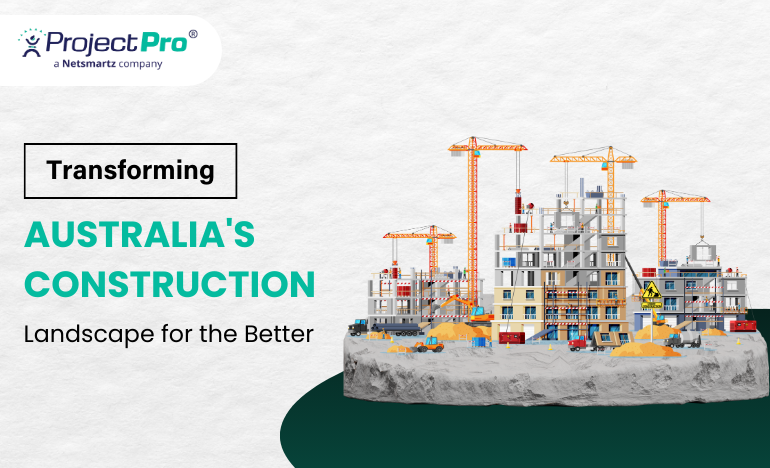How Inflation will Impact the Construction industry in 2023 and Beyond

Many developed economies are seeing a rapid rise in inflation rates, which impacts the construction industry. Along with the fact that skilled workers and necessary materials are now much more costly, supply chain pressures and shortages are making it harder to get building materials.
The price of several commodities, such as steel and lumber, which are vital for construction projects, has soared. Although the pandemic-related supply chain disruptions were the root of the problem, other challenges, like geopolitical risks, continue to pressure pricing.
Additionally, an increase in government-led infrastructure projects has caused a surge in demand for construction materials.
The construction industry is experiencing a decline in the number of workers as experienced workers undergoing an aging cohort retire or face local travel constraints. Moreover, people are transitioning into other fields due to higher pay in other industries.
Increasing Costs are Causing Margins To Suffer
Contractors and developers are feeling the impact of significant price increases across various materials, such as:
-
66% surge in fabricated steel prices,
-
notable hikes in softwood lumber costs, and a
-
more than 500% rise in oriented strand board (OSB) prices, which is a crucial wood product for building structures.
Often, businesses have no choice but to absorb these higher costs, which will further decrease their already minimal profits and liquidity.
Additionally, the bidding process is complex, and the lack of transparency regarding future prices is affecting contractors' competitiveness. For example, it is expected that bid prices in the UK will increase by up to 8.5% this year, compared to 6% in 2021.
Contractors' budgets are facing even greater pressure due to the increasing fuel prices. The expense of delivering materials to construction sites has risen significantly, and various essential pieces of heavy equipment, such as bulldozers, cranes, and backhoes, are fueled by gasoline.
For several years, the construction industry has been affected by a labor shortage, increasing wage costs and manual processes. These issues are unlikely to be resolved in the near future due to the current economic pressures.
Labor expenses can significantly affect the profitability of a project as wages may account for more than 50% of total construction costs.
What Does this Mean for the Construction Industry?
Rising costs are impacting the bidding process as most contractors work with narrow profit margins.
Predicting future expenses is becoming increasingly difficult due to significant price increases, which could be several times higher than the initial projections by the time work commences and even more by the end of the project.
Additionally, supply chain challenges leading to delays in procuring materials for job sites often make it challenging to estimate project completion times.
Most contractors are responsible for taking on the inflation risk. This can be particularly devastating for contractors working under fixed-price contracts if they misprice their bids, resulting in budgetary issues.
Consequently, many construction companies are facing financial difficulties and even going out of business.
Due to worries about project viability, certain contractors and developers have a more challenging time obtaining funding for their projects.
In an economy with significant inflation, funders are typically more careful when financing expensive, complex, or long-duration projects.
5 Steps to Fight Inflation
Contractors and developers should consider taking steps to ease the impact of inflation on their businesses, as it continues to affect economies and industries. Some of these steps include:
1. Compare project budgets to current prices
Comparing project budgets with current prices and considering how inflation, whether in labor or materials, may affect the project's overall cost. Being practical about rising prices and adjusting bidding procedures as necessary.
To account for price uncertainty and rising costs in the future, contractors may also consider changing their bidding approach by including contingencies in their pricing models.
2. Talk to the appropriate stakeholders about risk sharing
Have open conversations with project owners regarding possible hurdles and consider dividing the risk of inflation through contract terms, such as alliance-style agreements or distinct contract terms for both new and existing contracts.
This is already the norm in certain regions, like Latin America, where there have been extended periods of high inflation.
3. Consider supply chain issues as a challenge
Construction materials cost more, and acquiring them has become more difficult. As a result of this new circumstance, deadlines for ongoing projects and new proposals may need to be revised. You can use a dedicated Microsoft Dynamics Business Central construction software to overcome the issue efficiently.
4. Review your approaches to obtaining materials
Revisit your supply chain and assess its ability to withstand price hikes and delays. Consider the benefits of stockpiling critical supplies and balance the savings on budget and timing with the increased expenses for storage and security.
5. Review your insurance coverage
A project's overall cost will increase due to higher labor and material costs. Also, the sum insured may need to be adjusted to reduce the chance of being underinsured because losses will also result in more expensive rebuilds.
You can get assistance with the valuation procedure and an evaluation of your policy limitations from your broker or advisor for construction insurance.
The Final Verdict
All sizes of construction firms will have difficulties in the upcoming year. However, opportunities exist for businesses that can change course and seize the more extensive market trends while reducing risk and preserving healthy profit margins.
We hope the above-mentioned information will help you thrive in the industry. If you are looking for reliable accounting software for construction, ProjectPro is all that you need. Get in touch with us today!




.jpg)


